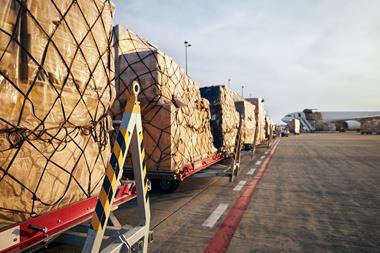Australia has joined the US and Canada in adding stricter security requirements for cargo originating from European and CIS countries.
From September 26, the country will require that cargo being transported on passenger aircraft destined for the country should only be tendered from shippers with whom the forwarder has an Established Business Relationship (EBR).
The Special Security Direction was issued by the Department of Home Affairs and applies to a total of 55 countries (list below).
According to UK forwarder association BIFA, carriers are taking similar but not always identical approaches to implementing the regulations.
“As there are subtle differences between individual carriers’ procedures, contact should be made with them to clarify their precise requirements,” BIFA said.
BIFA said that IAG has required that parties tendering cargo for passenger flights must confirm they have verified that all shipments are from shippers that meet the EBR criteria.
Stéphane Parrenin, manager, international freight and logistics, at the Australian forwarder association, IFCBAA, added: “Under this measure, air cargo consignments originating from 55 countries mainly located in Europe over 500g lodged by an unknown sender cannot be sent to or transferred in Australia on passenger aircraft.
“Such cargo may be uplifted on freighter aircraft only, subject to additional security checks and inspections.”
The new requirement follows a similar move by the US and Canada in response to reports that two packages containing incendiaries had caught fire within European parcel networks, with German police suspecting they were designed to damage infrastructure.
Forwarders have expressed concern over the new security requirements.
Global forwarder association FIATA said the emergency measures will have a significant impact on shippers in the European and CIS regions where they apply, particularly for micro, small and medium-sized enterprises (MSMEs) with lower volume shipments.
“Due to the complexity and suddenness of the new requirements, FIATA has received industry feedback voicing concerns on the uneven application of the new measures, as well as the new technical and operational challenges brought by the new data requirements introduced in the US Advance Cargo Air Screening (ACAS) programme,” FIATA said.
The US Airforwarders Association (AfA) also previously told Air Cargo News that obtaining some of the extra information requested by the US had created challenges for forwarders.
“The air cargo security landscape is constantly evolving in response to an ever-changing threat environment,” AfA executive director Brandon Fried said.
“While the enhancements to the Air Cargo Advanced Screening requirements are not surprising, their implementation has proven more complex than anticipated.
“Since the government requires airlines to implement these new procedures, much of the necessary information comes from freight forwarders who manage the shipments,”
“However, obtaining and sharing some of this additional information has presented practical challenges.
Albania
Czech Republic
Ireland
Monaco
Slovakia
Andorra
Denmark
Italy
Montenegro
Slovenia
Armenia
Estonia
Kazakhstan
Netherlands
Spain
Austria
Finland
Kosovo
North Macedonia
Sweden
Azerbaijan
France
Kyrgyzstan
Norway
Switzerland
Belarus
Georgia
Latvia
Poland
Tajikistan
Belgium
Germany
Liechtenstein
Portugal
Turkey
Bosnia and Herzegovina
Greece
Lithuania
Romania
Turkmenistan
Bulgaria
Holy See
Luxembourg
Russia
Ukraine
Croatia
Hungary
Malta
San Marino
United Kingdom
Republic of Cyprus
Iceland
Moldova
Serbia
Uzbekistan














